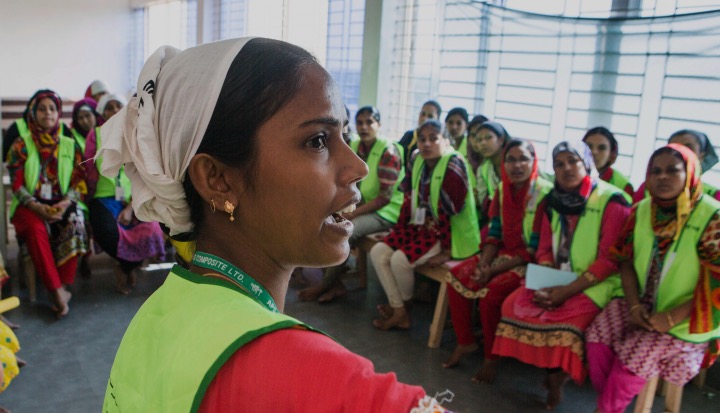Fire, heat, flood and drought are a recipe for climate disaster for workers. Companies urgently need to not only mitigate their causes, but also invest in sustainability, particularly in the health and well-being of women workers in corporate supply chains.
Women’s health is important for human rights, productivity and climate resilience. Women make up the majority of the workforce in many industriesand their health and well-being are greatly affected by practices and policies in global supply chains.
Climate Risks Put Growing Pressure on Global Supply Chains, and Women Bear the Burden
Climate change and heat stress are seriously affecting the safety, health and productivity of women workers in global supply chains. Women are also disproportionately affected by climate change harm to reproductive health and heat-induced violence, forced labor and sex work, and job losses in the first place when companies automate—to name a few impacts. This is compounded by the multiple vulnerabilities women face, including low income and education, limited access to reproductive health products and services and public benefits, and migration status. most of the women are migrantsoften driven and affected by climate change poor working conditions. As much as they are affected by climate change, women also lead climate resilience for their families and communities.
Climate change is increasing pressure on factories in the region to increase productivity, while improving human rights and overall working conditions. Companies and their supply chain partners have their own vested interests and commitment beyond the lens of philanthropy and limited legal compliance – to make women’s health part of the climate response.
Investing in women’s health and well-being is good business
Women’s health is like reining. This has many benefits for women’s human rights and health, with ripple effects on workplace productivity, management development, morale and employee retention. However, we know that many high impact but less measurable benefits are often not enough to influence corporate decision making. WEF with the McKinsey Health Institute report This year it estimates that closing this “women’s health gap” could be a $1 trillion boost to the global economy by 2040.
The good news is that there are many resources available for companies and their suppliers. These come from organizations and initiatives that don’t have “environment” in their name, but are at the forefront of addressing gendered climate impacts and health solutions that will be central to climate resilience in supply chain communities.
Developed in partnership with UNFPA-APRO to help build businesses to invest in women’s health. Good Business Lab a Return on Investment Tool (ROI-T). ROI-T currently estimates the return on investment in seven women’s health programs based on actual workplace interventions and performance metrics such as productivity, absenteeism, and turnover.
The tool aims to predict the financial feasibility of these health interventions at the workplace level by helping companies assess the financial benefits of investing in sexual and reproductive health (SRH) interventions. For example, studies have shown that it is possible to offer services and products in the workplace increase productivity by 15%clearly demonstrates that investing in the health and well-being of female employees is not only the right thing to do, but also the good thing.
Further work is being developed by UNFPA and its partners to complement ROI-T with gender-responsive family initiatives, gender-based violence and aggression, and more interventions related to climate change. For the latter, heat stress programs show incredible potential to provide significant productivity gains when women are among the most vulnerable, proving there are effective ways to protect workers from the heat. cheap and easy to implement.
Opportunities for Corporate Action on Women’s Health and Climate Resilience in Global Supply Chains
Companies would do well to join the UNFPA-led organization Coalition for Reproductive Justice in Business and is thinking of accepting new indicators for SRHR in the workplace. Or take action through World Economic Forum (WEF) Global Alliance for Women’s Health.
At the UN Foundation Universal Access Project, we started women’s health initiative will support this June measurable liabilities by companies to meet the health needs of their employees and workers in their supply chains and in the communities where they operate. The goal is to get companies to think differently about their role in advancing women’s health, including its connection to climate change.
Companies can now act on the climate risks that exist for workers, especially female workers, increasing sustainability and reducing climate impacts at the same time. This moment presents an unparalleled opportunity for companies to become agents of positive change. However, we know that material risk remains a key lens for corporate decision-making. “It is critical that women’s health becomes part of the climate and human rights corporate portfolio” cannot carry much weight.
But by not applying a wider aperture to the climate change risk lens, companies will miss the boat. And as the waters rise and production declines, they will no doubt need more than one, and as always, women workers will be left to fend for themselves and their families.
Shreya Murali, Senior Manager, Transformative Action and Senior Director David Wofford, United Nations Foundation Universal Access Project, Private Sector Strategy and Engagement.
With contributions from Davide De Beni, Regional Health Economist and Miguel Proença, Private Sector and Innovative Financing Specialist, UNFPA-APRO, United Nations Population Fund Regional Office for Asia and the Pacific.

